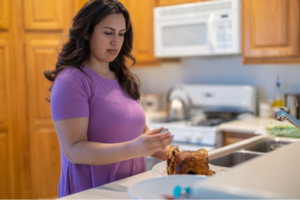Food Safety
 Harmful bacteria, viruses or parasites can contaminate food, causing food poisoning.
Harmful bacteria, viruses or parasites can contaminate food, causing food poisoning.
Use safe food handling practices to keep you and your family safe from food poisoning.
Check out the table below for a few tips.
| Clean | Clean your hands, surfaces, and utensils often:
Clean all surfaces, equipment, and utensils before and after you prepare food. |
| Separate | Separate your raw foods from your cooked foods and foods that you won’t be cooking.
Use different cutting boards and utensils for:
|
| Cook | Cook food completely. You can check this by using a digital food thermometer.
For safe internal cooking temperatures of different foods, check out Health Canada’s safe cooking temperatures page. |
| Chill | Keep ‘cold food cold’ and ‘hot food hot’. Bacteria can grow quickly when foods are in the temperature danger zone (between 4oC and 60oC).
Refrigerate food and leftovers promptly at 4°C or below. Refrigerate food and leftovers within two hours to reduce the chance of bacteria growing. |
For more information, check out Health Canada’s general food safety tips and interactive tool on food safety for food safety tips:
- At the grocery store
- In your kitchen
- In your fridge
- In your dining room
Who is at the highest risk of food poisoning and related complications?
Children aged five and under (click to expand) »Children ages five and under are at more risk of food poisoning because:
Foods to Avoid To lower your child’s risk of food poisoning, it is important to follow safe food handling practices like the ones listed above. It is also important to avoid giving your child certain foods such as:
If your child is less than a year old, avoid giving them honey. This includes pasteurized honey. Honey puts a young child at risk of infant botulism. Infant botulism can cause serious complications, including death, in babies. Well Water If you have a private well, test your water for bacteria twice a year. Free testing is available at Government Service Centres. You should test your private well water for metals such as arsenic, uranium and manganese at least once every two years. Infants fed powdered infant formula are most at risk. Check out Safe Food Handling for Children Ages 5 and Under for more information. |
People who are pregnant (click to expand) »If you are pregnant, you and your unborn baby are more at risk of food poisoning because:
Foods to Avoid To lower your and your baby’s risk of food poisoning, it is important to follow safe food handling practices like the ones listed above. It is also important to avoid foods that are higher risk, such as:
Well Water If you have a private well, it is also important to have your water tested for bacteria twice a year. Free testing is available at Government Service Centres. You should also test your private well water for metals such as arsenic, uranium and manganese at least once every two years. If you are planning to become pregnant, test your water for metals prior to becoming pregnant. Toxoplasmosis Toxoplasmosis is also dangerous for your unborn baby. In addition to the foods to avoid above, some tips to prevent toxoplasmosis include:
For more information about toxoplasmosis, click here. Check out Safe Food Handling for Pregnant Women for more information to keep you and your baby food safe. |
Adults 60 years and older (click to expand) »Most people who get food poisoning recover well, but for older adults, serious problems can be more problem because:
Foods to Avoid To lower your risk of food poisoning, it is important to follow safe food handling practices like the ones listed above. It is also important to avoid foods that are higher risk, such as:
Check out Safe Food Handling for Adults Ages 60 and Over for more information to keep you food safe. |
People with weakened immune systems (click to expand) »Some conditions, as well as treatments for certain conditions, can make it harder for you to fight bacteria that cause food poisoning. Examples include:
Foods to Avoid To lower your risk of food poisoning, it is important to follow safe food handling practices like the ones listed above. It is also important to avoid foods that are higher risk, such as:
Check out Safe Food Handling for Immunocompromised Individuals for more information to keep you food safe. |
Services related to this information:
- Contact your Public Health Nurse.
- 811 Dial-a-Dietitian/HealthLine (Newfoundland & Labrador) – Call 811 or 1-888-709-2929 / TTY 1-888-709-3555
- Well Water Testing – Free testing is available at Government Service Centres.

